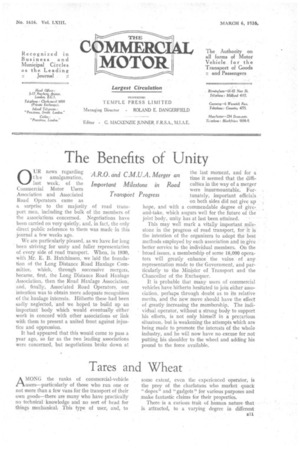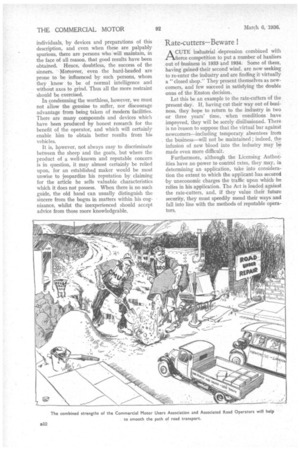Tares and Wheat A MONG the ranks of commercial-vehicle users—particularly of
Page 21

Page 22

If you've noticed an error in this article please click here to report it so we can fix it.
those who run one or not more than a few vans for the transport of their own goods—there are many who have practically no technical knowledge and no sort of head for things mechanical; This type of user, and, to some extent, even the experienced operator, is the prey of the charlatans who market quack "dopes" and "gadgets'.' for various purposes and ,make fantastic claims for their properties.
There is a curious trait of human nature that is attracted, to a varying degree in different 11 individuals, by devices and preparations of this description, and even when these are palpably spurious, there are persons who will maintain, in the face of all reason, that good results have been obtained. Hence, doubtless, the success of the sinners. Moreover, even the hard-headed are prone to be influenced by such persons, whom they know to be of normal intelligence and without axes to grind. Thus all the more restraint should be exercised.
In condemning the worthless, however, we must not allow the genuine to suffer, nor discourage advantage from being taken of modern facilities. There are many compounds and devices which have been produced by honest research for the benefit of the operator, and which will certainly enable biin to obtain better results from his vehicles.
It is, however, not always easy to discriminate between the sheep and the goats, but where the product of a well-known and reputable concern is in question, it may almost certainly be relied upon, for an established maker would be most unwise to jeopardize his reputation by claiming for the article he sells valuable characteristics which it does not possess. When there is no such guide, the old hand can usually distinguish the sincere from the bogus in matters within his cognizance, whilst the inexperienced should accept advice from those more knowledgeable.
Rate-cutters--Beware I
ACUTE industrial depression combined with fierce competition to put a number of hauliers out of business in 1933 and 1934. Some of them, having gained their second wind, are now seeking to re-enter the industry and are finding it virtually a " closed shop." They present themselves as newcomers, and few succeed in satisfying the double onus of the Enston decision.
Let this be an example to the rate-cutters of the present day. If, having cut their way out of business, they hope to return to the industry in two or three years' time, when conditions have improved, they will be sorely disillusioned. There is no 'reason to suppose that the virtual bar against newcomers—including temporary absentees from the business—will not be maintained ; indeed, the infusion of new blood into the industry may be made even more difficult.
Furthermore, although the Licensing Authorities have no power to control rates, they may, in determining an application, take into consideration the extent to which the applicant has secured by uneconomic charges the traffic upon which he relies in his application. The Act is loaded against the rate-cutters, and, if they value their future security, they must speedily mend their ways and fall into line with the methods of reputable operators.




















































































